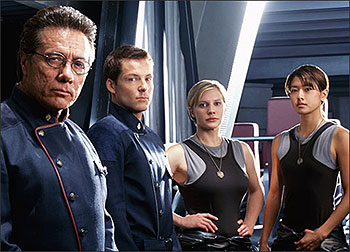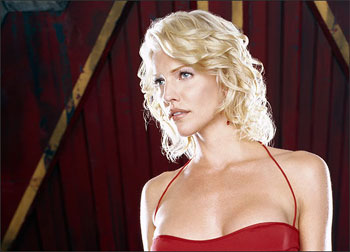The Grey Zone: Or, Why Battlestar Galactica Is So Frakkin’ Good
Published on September 29th, 2008 in: Current Faves, Issues, Science and Technology, TV |By David Speranza
I admit I was a latecomer to the new Battlestar Galactica. But as someone who hasn’t had cable since 1999, I’m a latecomer to pretty much all the cool shows (with the record going to The Prisoner, which I’m still trying to catch up with—only 40 years after it first aired). So it’s a point of pride for me that after watching Battlestar Galactica‘s first three seasons on DVD, followed by Amazon downloads of the first half of season four , I’m actually up to date on a current show (just in time, too—its final episodes start airing in January).

L – R: Cmdr. Adama, Apollo, Starbuck, Boomer
Image © 2004 Sci-Fi Channel
But even though I was late catching up—and didn’t have to endure every twist and turn and revelation in real time like so many of my more battle-scarred friends—I feel qualified enough to state, without equivocation, that Battlestar Galactica rocks.
Not exactly a catchy T-shirt slogan, but there it is. I love BSG (as we fans call it), and I’m not ashamed who knows it.
Why would one be ashamed? Well, for starters, there’s the cheesy 1970s show it was based on. The one with Lorne Greene (need I say more?). And two, it’s science fiction—which a lot of viewers, even today, automatically consign to the ghetto of “non-serious” genre television.
But where TV sci-fi is concerned, there’s BSG and there’s everything else. After all, for most people, TV science fiction means transporters, laser weapons, warp drives, and bipedal aliens with messed-up-looking heads and an inexplicable command of English.
Not that there’s anything wrong with that. But with its 2003 introductory miniseries, Galactica quickly brushed off the limitations of its genre and entered a realm of dark, disturbing, character-driven drama in which not only are enemy robots (who look like us) trying to eradicate our race, they’re also trying to love us. And mate with us. And teach us about God.
So there’s a bit more on its mind than just flashy effects and good versus evil (despite ample helpings of sexy robots, awesome sets, and jaw-dropping space battles). First and foremost, BSG is about people, and how they define their humanity. It’s a drama that just happens to be set in space.
Which is exactly what Ron Moore, the show’s creator—and a veteran of Star Trek: The Next Generation and Deep Space Nine—intended. While retaining the original show’s premise (a ragtag fleet of survivors search for Earth after their home planets are destroyed by a race of robots called Cylons), Moore was determined to make every other aspect of the show as realistic and uncompromising as possible—”Blade Runner meets Black Hawk Down,” as he put it.

One of Battlestar Galactica‘s
sexy robots
Image © 2004 Sci-Fi Channel
And boy, is it realistic. On this show, wounds take months to heal (if at all); fuel supplies get low; democracies unravel; people (even the heroes) do rash, unsympathetic things, while many of the bad guys are unexpectedly admirable. Hovering over that is the show’s verité-like approach, which brings immediacy to a distant time and place that’s clearly rooted in the here and now. As in our world, there are no latex-covered alien heads spouting perfect English. No “lasers.” No positronic flux capacitors. (Okay, there are the equivalent of warp drives, but the show’s premise kind of demands that.)
But there’s more than just gritty realism. Like all the best dramas, this one isn’t afraid to make you think and feel in ways that are not only contradictory but force you to question your most basic beliefs (“What do I believe in? What’s right? What’s wrong?”). It’s provocative and exhilarating and will make even longtime Trekkies nervous about revisiting the comparatively cardboard antics of Kirk and Picard.
Most of that’s due to the exemplary writing of Moore and his staff. But there’s also inspired direction, brilliant cinematography, and some of the best—and most underappreciated—acting on television. (Has there ever been a TV character more damaged, self-destructive, and often unlikable—yet still painfully sympathetic—than Katee Sackhoff’s Starbuck?) And the series’ ongoing game of “Who’s the Cylon?” adds a thread of mystery that remains constant—and titillating—throughout the entire series.
Forget that it’s sci-fi: if you like drama spiced with action, mystery, military realism, politics, moral grey zones and a touch of humor (not to mention sexy robots, awesome sets, and jaw-dropping space battles), then rent, buy, or borrow the DVDs posthaste. Because in only three short (or long, if you’re a fan) months, the last ten episodes will air, and one of the best shows on television will end.
Like those other fans, I both long for and dread those Final Ten. Now that I think of it, this may be the perfect time to dust off my long-neglected boxed set of The Prisoner.
Time limit is exhausted. Please reload the CAPTCHA.